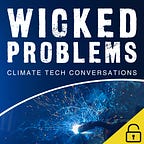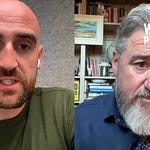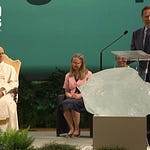Here’s a pitch: a novelist is struggling with a political thriller, because every time he comes up with a new disaster for his characters to cope with, he turns on CNN and sees it happen the next day in almost exactly the way he wrote it. So he has to rewrite that chapter to amp up the drama. Followed by a yet more extreme real-world event.
If that’s not a future Black Mirror episode at the very least, or something Christopher Nolan doesn’t option, I’ll be very disappointed.
And yet that’s basically the real story of Stephen Markley. Named a Times Book of the Year by friend-of-the-show Ben Cooke, Markley’s second novel, The Deluge, is proving spookily prophetic. It’s also an epic, in the literal sense. Set over 30 years, written over a decade, with painstaking research to keep it grounded in the latest science, it’s a thought experiment in how the US political system could bend (and maybe break) under the pressure of climate chaos. But each time he thought he was finished with some outlandish fictional touch, the real world gave him a slap.
The book offers an entertainer-turned-presidential candidate with his own version of the Bible; a wildfire that threatens Los Angeles; fascist politicians rising to power in Europe on explicitly anti-climate-immigrant platforms; new draconian laws drafted by oil lobbyists to facilitate jailing of anti-fossil-fuel protestors; a tech VC who manipulates social media to become president; and of course the very unlikely scenario of fleeing the coast to a “climate safe” mountain town to escape a mega-Hurricane only to have to cut through the roof to hope for helicopter rescue as the waters rise.
I wish I was kidding. I think Stephen Markley does too. It probably would have made his conversations with his publisher a bit easier. But it’s also why The Deluge is arguably the most important genre-busting novel of the last 10 years. It defies Amitav Ghosh’s despair at the inability of the novel to deal with the climate crisis - and avoids some of the preachy pitfalls even Kim Stanley Robinson fell into with Ministry for the Future.1
The Deluge also, contra Apple TV’s ambitious but ultimately unsatisfying Extrapolations2 and Adam McKay’s achievement in making an apocalypse satire both boring and unfunny in Don’t Look Up, never forgets that its first duty is to entertain, make you care about its characters and their fates, and pepper it with enough sex, drugs and violence to be a book that doesn’t bludgeon with a “message” so much as do what the best fiction should do. Put characters into increasingly extreme situations and see what happens, and in an epic you have scope to show how those situations can warp entire societies over time - think Dostoyevsky, or The Wire. It just so happens that climate change keeps providing ample supply of said extreme situations.
So I was chuffed that Stephen Markley could give us an hour to talk about the book. Thanks to WP alumnus Rupert Read for introducing us. Hope you enjoy.
And in honour of Markley’s beloved Ohio, we have added some suitable music from our (other) fave Buckeye State native sons for the outro track.
And if you can, donate to relief for Hurricane Helene.
Catalysts
Here’s what Stephen shared as catalysts for his thinking about climate and climate tech:
Stephen was deeply inspired by James Hansen, the NASA scientist famous for testifying before Congress in 1988 about the dangers of climate change. Hansen’s courage, persistence, and calm dedication to warning humanity about the unfolding climate crisis serve as a beacon of what real, understated heroism looks like.
Zen and the Art of Saving the Planet by Thich Nhat Hanh:
This book by Thich Nhat Hanh offered Stephen an invaluable perspective on balancing urgency and patience in the face of an overwhelming crisis. It presents the idea that being deeply present and cultivating mindfulness can help maintain the long-term stamina needed to address the climate crisis. It’s a call to action that remains rooted in compassion and personal resilience. You can find more about Thich Nhat Hanh's work and teachings on the Plum Village website.
Volts by David Roberts:
Stephen recommended David Roberts' Volts podcast as a key source of energy and insight. The podcast explores clean energy and climate policy, showcasing the rising army of people dedicated to solving these challenges. Stephen finds it particularly energizing to hear about the nitty-gritty details of policy, technology, and activism that help him stay informed and motivated. You can find the Volts podcast on David Roberts' website.
Stephen emphasized the importance of civic engagement in the fight against climate change. The Environmental Voter Project aims to increase voter turnout among environmentalists, helping turn low-propensity environmental voters into consistent participants in elections. Stephen believes that this kind of grassroots involvement is essential to driving systemic change. Learn more and get involved at the Environmental Voter Project website.
Francis Fukuyama (yes that one) introduced his interview with Termination Shock author Neal Stephenson by contrasting it with MftF: “it reads like a sermon about global warming and the evils of neoliberalism rather than a novel”.
Like previous guest Akshat Rathi, we do want to give shoutouts to the episode set in India. That was great.














